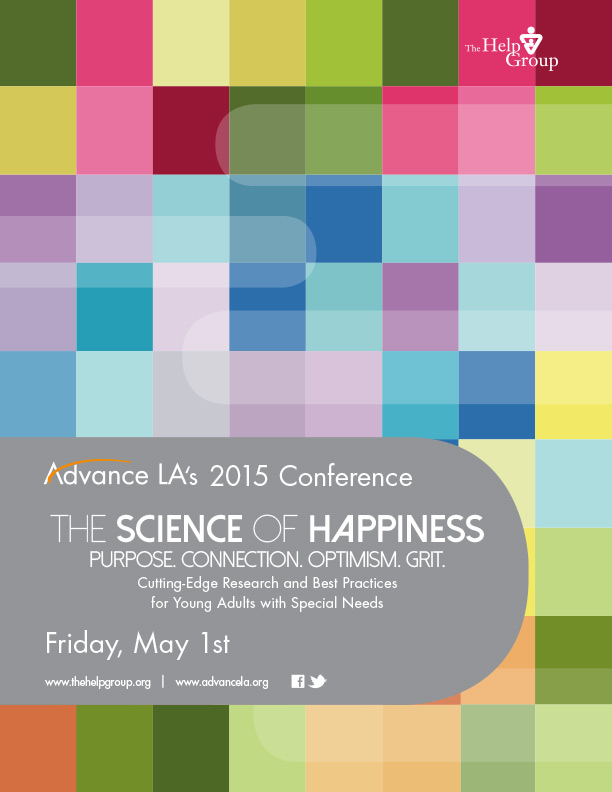The Science of Happiness: Purpose. Connection. Optimism. Grit.
The 4th Annual Advance LA Conference, The Science of Happiness: Purpose. Connection. Optimism. Grit., was a huge success. Speakers presented practical ways to foster and maintain happiness through the development of purpose, connection, optimism, and grit.
Friday, May 1, 2015
Our Keynote Speaker, Sonja Lyubomirsky, Ph.D., described when and why practices such as gratitude or kindness work “best” and covered new research on how small and simple activities can transform people into happier individuals.
Back by popular demand, Andrew Shatte, Ph.D. detailed the thinking styles that make the difference and reveal the keys to a more hopeful and optimistic life.
Participants also had the opportunity to attend presentations by Anthony Rostain, MD, MA; Liz Laugeson, PsyD; Shauna Shapiro, PhD; Art Markman, PhD; Brian Galla, PhD; Elisha Goldstein, PhD; Jenni Mariano, PhD; and many, many more. Presentations included topics on executive functioning, social connections, parenting the young adult, the importance of self-control and grit, finding purpose, and managing the transition from high school to college or the workforce.

Keynote Speaker, Dr. Sonja Lyubomirsky
Gold Sponsor

Media Sponsor

Session Descriptions
KEYNOTE SPEAKER
The Science of Happiness
Sonja Lyubomirsky, PhD
Happiness not only feels good; it is good. Happy people have closer friendships, stronger social support, stronger immune function, and higher productivity at work. Young people with special needs experience these same benefits of positive emotions as their typical peers. Fortunately, experiments have shown that people can intentionally increase their happiness. Lyubomirsky will describe when and why such practices as gratitude or kindness work “best.” This presentation will cover new research on how small and simple activities can transform people into happier individuals.
Learning Objectives:
- Participants will identify three critical obstacles to the possibility of creating lasting happiness.
- Participants will describe the three determinants of an individual’s chronic happiness level and the data supporting them.
- Participants will list three intentional activities that have been shown to increase happiness and the factors that moderate their effectiveness.
- Participants will explore how to impart this knowledge to others
OPTIMISM
The Next Frontier: Neurodiversity in the Workplace
Lindsey Sterling, Ph.D.
Level: Intermediate; Audience: General
This session will discuss the concept of neurodiversity and present ASD as a form of neurodivergence. Strengths and challenges often observed in ASD will be framed in terms of human variation. Diverse characteristics will be discussed within the context of a work environment, highlighting ways in which individuals with ASD can capitalize on strengths to contribute to the workplace. Implications for employment will be discussed.
Learning Objectives – At the end of this session, participants will be able to:
- Define the term Neurodiversity
- Explain how Neurodiversity applies to ASD
- Discuss strengths and challenges in ASD that can be framed in terms of human variation
- Identify at least three ways in which strengths in ASD can contribute to the workplace
- Identify at least two implications for employment in ASD
CONNECTION
2A
Executive Functioning: Building Internal Scaffolding for the Young Adult
Anthony Rostain, MD, MA
People with neurodevelopmental disorders tend to have disorders of executive functioning which frequently present major challenges to successful adaptation. Several factors make up the executive functions including time management, organization/problem solving, self-motivation, impulse control (inhibition) and emotional self-control. This session will review the development and disorders of executive functioning, as well as ways to assess executive functioning in adolescents and young adults using standardized scales. Finally, it will present strategies for addressing disorders of executive functioning including tools and resources that can be applied to working with young people in a variety of settings (school, home, community).
Learning Objectives:
- Participants will define executive functioning (EF) and its role in human development.
- Participants will review disorders of EF commonly seen in young adults with neurodevelopmental disorders.
- Participants will discuss ways to assess EF disorders using standardized scales.
- Participants will identify helpful strategies and resources for addressing EF disorders.
- Participants will explore how to impart this knowledge to others.
2B
Social Connections: Making Friends and Dating for Young Adults on the Autism Spectrum using the PEERS Method
Liz Laugeson, PsyD
Social connections are critically important for young adults and having one or two friends is a predictive of later adjustment. Friends can buffer the impact of stressful life events, correlate positively with self-esteem, increase independence, and correlate negatively with depression and anxiety. This session will provide an overview of an evidence-based social skills intervention for young adults with Autism Spectrum Disorder, known as PEERS for young adults. The PEERS method has been used to successfully teach teens and young adults ways to help them make and keep friends, and to develop romantic relationships.
Learning Objectives:
- Participants will understand the social challenges facing young adults with ASD.
- Participants will gain an overview of evidence-based methods of teaching social skills to adults with ASD.
- Participants will obtain an overview of some empirically-validated strategies for improving relationships.
- Participants will explore how to impart this knowledge to others.
2C
The Mind-Body Connection: Supporting the Development of Self-Compassion through Mindfulness
Shauna Shapiro, PhD
Mindfulness has numerous benefits for those with special needs and their caregivers including increased focus, working memory, immune functioning, well-being and cognitive flexibility. The session will provide a foundation of scientific research in mindfulness and meditative practices for parents, educators, and health care professionals. Drawing on current research in psychology, medicine and cognitive neuroscience, we will investigate the effects of mindfulness meditation on decreasing pathology and increasing positive psychological and physiological states in ourselves and others.
Learning Objectives:
- Participants will be knowledgeable of current meditation research spanning the fields of psychotherapy, medicine, education, parenting and cognitive neuroscience.
- Participants will be able to define mindfulness and three core elements of mindfulness.
- Participants will be knowledgeable of different means of integrating mindfulness and meditation parenting and education.
- Participants will be knowledgeable about the importance of compassion and self-compassion for parenting and education.
- Participants will explore how to impart this knowledge to others.
2D
Progress in Millimeters: Parenting the Young Adult
Bonnie Auerbach, PhD
Crystal Lee, PsyD
Parenting a young adult with special needs presents unique challenges. This presentation will focus on assisting both parents and professionals in utilizing effective strategies to launch young adults towards independence. We will review research about “emerging adulthood” in the normative and special needs population. A transactional model on parenting young adults rooted in the family systems approach will present specific steps to increase independence. It is our goal for participants to leave our presentation with tangible tools and a realistic sense of hope about the future.
Learning Objectives:
- Participants will learn the unique markers of emerging adulthood in a changing cultural landscape.
- Participants will identify family interactional patterns that have previously hindered successfully launching towards independence.
- Participants will learn how to modify family interactions to increase autonomy and independence in young adults with special needs through a step-wise model.
- Participants will explore how to impart this knowledge to others.
GRIT
3A
Utilizing Medication and Cognitive-Behavioral Therapy for Young Adults with ADHD
Anthony Rostain, MD, MA
Young adults with ADHD are at risk for experiencing numerous life difficulties as a consequence of impairments in the cognitive-behavioral skills that form the basis of self-control, also known as the executive functions. There is now good evidence that combining medications and cognitive-behavioral therapy for young adults with ADHD can have a positive impact on both ADHD symptoms and psychosocial functioning. This session will present an overview of the key issues facing young adults with ADHD and related disorders, review clinical evidence documenting efficacy of integrated treatments, and illustrate types of interventions that have been shown to improve outcomes.
Learning Objectives:
- Participants will be able to list major challenges facing young adults with ADHD and related disorders.
- Participants will discuss key studies documenting the efficacy of combined treatment for patients with ADHD.
- Participants will review the evolving consensus regarding best practices for integrating treatment modalities.
- Participants will discuss key strategies for helping young adults with ADHD cope better with their challenges.
- Participants will explore how to impart this knowledge to others.
3B
Smart Change: Tools to Create New and Sustainable Habits
Art Markman, PhD
Motivation and good habits can help young adults with special needs to develop effective work, social, and life routines. This talk focuses on the five core elements of behavior change: setting goals, developing plans, overcoming temptations, managing the environment, and engaging with people. Each segment of the talk comes with practical exercises that can be used with young adults.
Learning Objectives:
- Participants will engage current research on motivation and habit change to understand the core reasons why young adults may fail in their transition to more independent living.
- Participants will become adept at using science-based tools to develop plans and manage temptations to achieve goals.
- Participants will analyze methods for managing the environment to promote appropriate long-term behaviors.
- Participants will analyze strategies for engaging young adults in a course of habit change.
- Participants will explore how to impart this knowledge to others.
3C
The Importance of Self-Control and Grit
Brian Galla, PhD
Young people with special needs will encounter a variety of challenges throughout their lives. As students move beyond the classroom support system into adulthood, psychological resources such as grit will allow them to continue to thrive. This session will cover how competencies (or lack thereof) in self-control and grit play out in adolescents, and young adults; their relationship to traditional measures of achievement and success; and learnable, teachable strategies that facilitate their expression.
Learning Objectives:
- Participants will broadly understand of self-control and grit across adolescence and young adulthood.
- Participants will summarize empirical evidence on the importance of self-control and grit for promoting achievement and life success.
- Participants will learn strategies that facilitate the expression of self-control and grit.
- Participants will explore how to impart this knowledge to others.
3D
Uncovering Happiness: Developing a Naturally Anti-Depressant Brain and Boosting Grit
Elisha Goldstein, PhD
Although the most widespread treatment for depression today is the use of antidepressants, mindfulness and self-compassion techniques can be equally potent for releasing natural antidepressants in the brain. In this workshop, we’ll explore how the latest neuroscience research can illuminate our approach with depressed clients, especially the discovery of the parallels between the effects of trauma and depression on the brain.
Learning Objectives:
- Participants will understand the effects of depression on different parts of the brain and how to stimulate activity in these areas.
- Participants will be able to incorporate self-compassion practices in their work to facilitate a shift in left prefrontal cortex activity.
- Participants will understand how to boost neural activity in sessions to enhance cognitive processing and increase vagal tone.
- Participants will understand the theory and practice behind positive neuroplasticity.
- Participants will explore how to impart this knowledge to others.
PURPOSE
4A
The Role of Purpose in the Transition to Adulthood
Jenni Mariano, PhD
Finding purpose is particularly challenging for young people with special needs. This session introduces participants to the contemporary research and perspectives on the principles and nuances of positive life purpose development, especially during life transitions and that of the transition to adulthood. Attendees also participate in a brief activity for all ages designed to promote purpose identification and engagement.
Learning Objectives:
- Participants will understand historical and contemporary forces impacting life purpose and contemporary research on what is known about the benefits of purpose, and how purpose is found and developed.
- Participants will learn to use specific evidence-based tools to enhance positive purpose development that can be used by individuals in multiple settings.
- Participants will explore how to impart this knowledge to others.
4B
Managing the Successful Transition from High School to College for Young Adults with Challenges
Lisa King, M.Ed
The social, academic, and interpersonal expectations of students are very different once they transition to college. We can help students and parents prepare for this major life transition while still in high school. A variety of higher education options and services are available to students with disabilities as alternative ways to begin successful transitions to college. This session will cover an extensive comparison and clarification of the differences between the high school setting and the college setting, including: entitlement versus eligibility, access versus success, documentation and assessment requirements, special education versus disability services and accommodations.
Learning Objectives:
- Participants will learn about the major skills needed by students with challenges PRIOR to enrolling in colleges or universities.
- Participants will compare and contrast the differences in the laws governing higher education vs. k-12.
- Participants will understand the documentation needed by a student with a disability to obtain accommodations at college.
- Participants will learn about the differences in types of post-secondary options and support services including fee for service.
- Participants will understand the role of the Disability Specialist in higher ed and the differences between accommodations and services.
- Participants will explore how to impart this knowledge to others.
4C
How STEM is Opening Doors: Discovering Purpose and Opportunity for Individuals on the Spectrum
Panel Moderator: Ellis Crasnow, PhD
Panelists: Anthony B. Maddox, PhD, Thorkil Sonne, Maria Nicolacoudis, MA
Career openings in STEM (Science, Technology, Engineering and Math) fields are expected to outpace qualified candidates even more overwhelmingly in the near future, in some cases by five to one. This has encouraged prospective employers to look at candidates that they would previously have not considered. Individuals on the high functioning end of the autism spectrum are uniquely placed to benefit because many of them possess the natural talents and inclinations which make them a perfect fit for such careers.
Learning Objectives:
- Participants will discuss the characteristics of those on the spectrum which lend themselves particularly well to STEM careers.
- Participants will learn the high school classes that provide an excellent springboard to further education or a career in a STEM field.
- Participants will discuss trainings that are offered post-high school that can lead to well-paying careers in STEM fields.
- Participants will learn the career choices that are particularly appropriate for those on the high functioning end of the spectrum.
- Participants will identify abilities and characteristics employers in STEM fields are looking for in a prospective candidate.
- Participants will learn what accommodations are necessary for those on the spectrum in the workplace and during the interview process in order to maximize their chances of success.
- Participants will explore how to impart this knowledge to others.
4D
Supporting the Transition from School to Adult Life: Employment for Individuals with Special Needs
Laura Owens, PhD
Completing high school is a very important time for all students, especially students with disabilities. The real engine of social change is not money, but rather expectations. Employment First policies and practices focus on raising expectations and ensuring that youth graduating from high school have opportunities for meaningful work with real wages, and benefits, in local businesses. Participants will learn about Employment First as it relates to transition and strategies to assist young adults in obtaining and maintaining employment through work experiences and community connections. The presentation will focus on person-centered planning and job development activities to improve employment opportunities for young adults with disabilities.
Learning Objectives:
- Participants will identify the values of Employment First.
- Participants will identify the challenges with the “readiness” model of transition.
- Participants will develop strategies to engage young adults in the job search process.
- Participants will learn ways to negotiate with the business community.
- Participants will explore how to impart this knowledge to others.
Presenters
KEYNOTE SPEAKER

Sonja Lyubomirsky, Ph.D.
Professor of Psychology at the University of California, Riverside; Received her B.A. summa cum laude from Harvard University and her Ph.D. in social psychology from Stanford University; Her research on the science of happiness has been the recipients of many honors, including the Templeton Positive Psychology Prize and a Science of Generosity grant; Author of best-selling 2008 book, The How of Happiness: A Scientific Approach to Getting the Life You Want and recently published The Myths of Happiness: What Should Make You Happy, But Doesn’t, What Shouldn’t Make You Happy, But Does.
OPTIMISM

Andrew Shatté, Ph.D.
Research Professor in the College of Medicine at The University of Arizona; Fellow at the Brookings Institution; Chief Science Officer at meQuilibrium; Chief Knowledge Officer with FINAO Nation; Co-author of The Resilience Factor: Seven Essential Skills For Overcoming Life’s Inevitable Obstacles and recently published meQuilibrium: 14 Days to Cooler, Calmer, and Happier.
CONNECTION

Anthony L. Rostain, MD
Professor of Psychiatry and Pediatrics at the Perelman School of Medicine, University of Pennsylvania; Director of Education for the Department of Psychiatry; Director of the Adult Developmental Disorders (ADD) Program; Director of The Children’s Hospital of Philadelphia Behavioral Health Center’s Developmental Neuropsychiatry Program.

Elizabeth Laugeson, Psy.D.
Assitant Clinical Professor, Department of Psychiatry and Biobehavioral Sciences at the UCLA Semel Institute for Neuroscience and Human Behavior; Founder and Director of the UCLA PEERS Clinic; Director of The Help Group – UCLA Autism Research Alliance; Author of The Science of Making Friends: Helping Socially Challenged Teens and Young Adults.

Shauna Shapiro, Ph.D.
Professor of Counseling Psychology at Santa Clara University; Clinical psychologist and internationally recognized expert in mindfulness; Co-author of Mindful Discipline: A loving approach to setting limits and raising an emotionally intelligent Child and The Art and Science of Mindfulness: Integrating Mindfulness Into Psychology and the Helping Professions.

Bonnie Auerbach, Ph.D.
Clinical Director of The Help Group’s Advance LA Program; Seasoned clinician with more than 30 years of experience working with adolescents, young adults, and their families.

Crystal I. Lee, Psy.D.
Licensed Psychologist and Assistant Director of The Help Group’s Advance LA Program; over a decade of experience working with individuals with diverse challenges and their families.
GRIT

Art Markman, Ph.D.
Annabel Irion Worsham Centennial Professor of Psychology and Marketing, University of Texas at Austin; Founding Director of the Program in the Human Dimensions of Organizations. Author of Smart Thinking: Three Essential Keys to Solve Problems, Innovate, and Get Things Done and Smart Change: Five Tools to Create New and Sustainable Habits in Yourself and Others.

Brian M. Galla, Ph.D.
Postdoctoral fellow in Angela Duckworth’s lab at the University of Pennsylvania focusing on how noncognitive skills, including self-control and grit, impact academic outcomes and healthy youth development; published in the Journal of Personality and Social Psychology and in Contemporary Educational Psychology.

Anthony L. Rostain, MD
Professor of Psychiatry and Pediatrics at the Perelman School of Medicine, University of Pennsylvania; Director of Education for the Department of Psychiatry; Director of the Adult Developmental Disorders (ADD) Program; Director of The Children’s Hospital of Philadelphia Behavioral Health Center’s Developmental Neuropsychiatry Program.
PURPOSE

Jenni Menon Mariano, Ph.D.
Associate professor in the College of Education, Southern Florida University Sarasota-Manatee; Serves on the editorial board of the journal Applied Developmental Science, and the advisory council of Echoing Green’s Work on Purpose Program.

Lisa King, M.Ed.
Co-Director of College Autism Spectrum and Director of Higher Education and Autism Spectrum Disorders, Inc.; Access Consultant at St. Catherine University; Co-author of The Parents Guide to College for Students on the Autism Spectrum, and Social Behavior and Self Management: 5 point scales for Adolescents and Adults.

Laura Owens, Ph.D.
Associate Professor at the University of Wisconsin-Milwaukee in the department of Exceptional Education; President of TransCen, Inc; Director/Founder of Creative Employment Opportunities, Inc. (CEO), an employment agency for individuals with disabilities in Milwaukee, Wisconsin; Previous Executive Director of APSE.

Ellis Crasnow, Ph.D.
Director of STEM Education at Village Glen School; More than 20 years of experience in the education field; Presentations include STEM and Autism: The Strong Potential of those on the Spectrum; publishes weekly blog, How STEM is a boon for those on the spectrum.

Anthony B. Maddox, PhD
Professor of Clinical Education and Engineering with the University of Southern California Rossier School of Education; Teaches in the USC Rossier Online Master of Arts in Teaching (MAT) and Master of Education in Advanced Instruction Programs; Focus is Secondary STEM (science, technology, engineering, and mathematics) and Elementary Mathematics and Science; Serves as Coordinator for and teaches the Multimedia Literacy and New Media Literacies courses in both programs; Recently appointed as a Research Fellow with the Annenberg Innovation Laboratory and member of its Research Council; Co-Principal Investigator on a National Science Foundation Robert Noyce Teacher Scholarship Program Grant for science teacher candidates in the MAT.

Thorkil Sonne
Founder of the not-for-profit Specialist People Foundation, which owns the For-Profit Specialisterne founded in 2004 to make a future for his son, who was diagnosed with autism at the age of three; Has a background in IT and as chair of a local autism organization Has been honoured with the Autism Prize 2004 by Autism Denmark and IT Prize by The Danish IT Industry Association; Was also named ‘Brave Thinkers’ by The Atlantic Magazine and ‘Intelligent Optimist’ by Ode Magazine.

Maria Nicolacoudis, MA
Executive Director of EXPANDability; Over 25 years experience working with persons with disabilities; Trains and consults with employers on ADA, disability etiquette and accommodations; Served on the board of H.O.P.E., as Chair of the Santa Clara County Committee for Employment of Persons with Disabilities and as an appointee to the California Governor’s Committee for the Employment of Persons with Disabilities; Currently an appointee and the Chair of the California Committee for the Employment of Persons with Disabilities.
Exhibitors
Platinum Bay Technologies
Platinum Bay Technologies is a software technology company designed from the ground up to create successful and empowering full-stack software engineering careers to individuals on the Autism Spectrum. Platinum Bay specializes in custom business applications and software solutions for mid-sized businesses, concierge CTO services, and enterprise job and data flow automation. As a limited-profit social enterprise and California Social Purpose Corporation, we have no shareholders and all profit is reinvested in pursuit of our mission, with a portion of net profit going to the Platinum Bay Foundation to strengthen the Autism ecosystem through targeted, strategic investments and advocacy based on opportunity, potential, giftedness, and inclusion. Learn more at www.platinumbay.com.
LA Parent
At LA Parent our mission is simple: We want to bring our families the best parenting resources in Los Angeles. And we never forget about fun! Our extensive calendar of events is the go-to source of information for fun things to do with your kids each month. We provide you the most in depth list of things to do in L.A. with kids.
L.A. Parent began with a vision: To discover Los Angeles through the eyes of a child. The first issue of the magazine, originally called “Pony Ride,” was published in 1980. For 34 years, we have been a companion and a guide for families throughout Los Angeles, and we’re looking forward to continuing that tradition for generations to come. www.laparent.com
Advance LA
At Advance LA we offer the answer to one of the most frequently asked questions by parents of teens and young adults with special needs, “What happens next?” Our personalized program provides clients with the experiences and opportunities necessary to lead a fulfilling adult life.
Advance LA is dedicated to providing resources, support, and training to teens and young adults with a wide range of needs including learning disabilities, Autism Spectrum Disorders, Asperger’s Syndrome, executive functioning difficulties, ADHD, and other social, emotional and behavioral challenges including substance abuse recovery. www.advancela.org
Special Needs Project – Booksellers
Special Needs Project is a unique disability bookstore. We carry books, videos, DVDs and related items about mental and physical disabilities…for parents, professionals, educators, family members and persons with a disability. We have the largest collection of books about autism spectrum disorders (nearly 800 titles) we know of. www.specialneedsproject.com
Special Needs Project – Trusts
Special Needs Project is a non-profit dedicated to educating and advocating for individuals with special needs, their families and the community by providing for their current and future care, security and quality of life. [email protected]
Mobility Management Partners
NY Life
Woodsmall Law Group
Jewels for Life Consulting
California Mentor
UCLA CART
The UCLA Center for Autism Research and Treatment (CART), a National Institutes of Health Autism Center of Excellence (ACE), plays a leading role — locally, nationally and internationally — in developing an improved understanding of the biological and psychosocial basis of autism. Combining our excellence in research, education and assessment, the Center continues to develop and disseminate new and more effective treatments for autism and autism spectrum disorders.
Utilizing a strong interdisciplinary approach in genetics, neurobiology, psychology, brain imaging and psychiatry, the Center’s main research aim is to understand the origins of the social, communicative, and language deficits demonstrated by individuals with autism and related disorders. CART is also proud of its outreach to families and community practitioners, building strong partnerships with members of the autism community. www.semel.ucla.edu/autism
UCLA Autism Research Alliance
The Alliance is an innovative partnership between The Help Group and the UCLA Semel Institute for Neuroscience and Human Behavior and is dedicated to enhancing and expanding clinical research in the education and treatment of those with autism spectrum disorder (ASD) and to contributing to the development, greater understanding and use of best practice models by researchers, educators and clinicians. Read more about the UCLA Autism Research Alliance.
Silverlining
Silverlining, an upscale resale boutique founded in 2011 and located on the Westside of Los Angeles in Culver City, offers a wide selection of new, vintage, and gently used fashionable and designer clothing, shoes, and accessories for men, women, and children. However, Silverlining is much more than your typical designer resale store!
Recognizing the pressing need for students with autism spectrum disorders, learning disabilities, and other challenges to develop vocational experience and skills, The Help Group created Silverlining to serve as a student vocational training center. Since its opening, Silverlining has enabled these students to learn and develop valuable job-related skills that contribute to their knowledge, self-confidence, employability, and future independence. www.silverliningresale.org
Kids Like Me
All children need opportunities to have fun, make friends, learn new skills, connect with others and enjoy a sense of belonging… That’s what Kids Like Me is all about!
The Help Group Kids Like Me programs, located in the Los Angeles area, are designed especially for children and adolescents with autism spectrum disorder and other special needs. Children with special needs can benefit greatly from fun, recreational activities that encourage social skills as well as developmental growth.
Kids Like Me participants will enjoy a wide variety of enriching programs. Each child from preschool age to high school age will be engaged in structured activities facilitated and overseen by highly trained professionals. www.kidslikeme.org
The Help Group – Schools
Founded in 1975, The Help Group is the largest, most innovative and comprehensive nonprofit of its kind in the United States serving children with special needs related to autism spectrum disorder, learning disabilities, ADHD, developmental delays, abuse and emotional problems.
The Help Group’s nine specialized day schools offer pre-K through high school programs for more than 1,550 students. Its broad range of mental health and therapy services, child abuse and residential programs extends its reach to more than 6,000 children and their families each year. With more than 980 staff members, The Help Group’s state-of-the-art schools and programs are located on seven campuses in the Los Angeles area.
The Help Group is widely regarded for its high standards of excellence, unique scope and breadth of services. Through its public awareness, professional training and parent education programs and efforts at the state and national levels, The Help Group touches the lives of children with special needs across the country and in other parts of the world.
At the heart of its efforts is the commitment to helping young people fulfill their potential to lead positive, productive and rewarding lives. www.thehelpgroup.org

